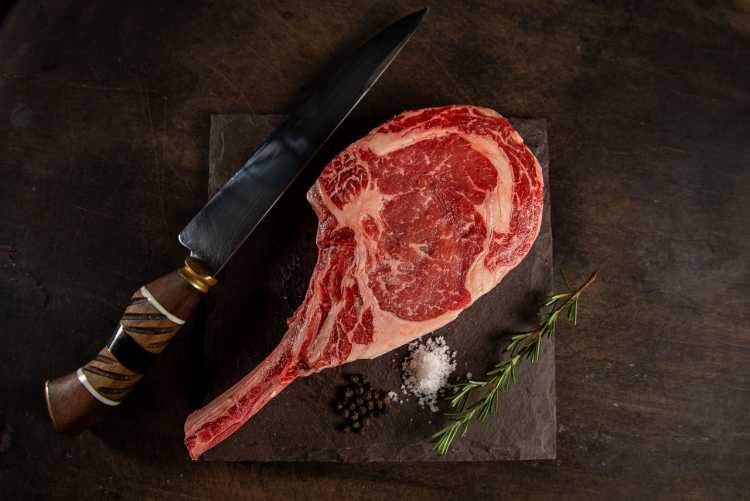If you’ve cooked a prime rib for Sunday dinner and have leftovers, you may be wondering if you can freeze them. The answer is yes – but there are a few things to keep in mind to make sure your Prime Rib is just as delicious when reheated. Here’s what you need to know about freezing and reheating your Prime Rib.

Quick Answer
Yes. The taste and texture will be slightly impacted, but it will last for a few months in the freezer.
When freezing a prime rib, you should do so as quickly as possible. This will help to minimize the amount of ice crystals that form, which can damage the meat tissue and affect the taste and texture. Wrapping it tightly in plastic wrap before freezing will also help to prevent freezer burn.
A prime rib will stay good in the freezer for 2-3 months.
Can You Freeze a Prime Rib?
Can you freeze a prime rib? The answer is yes, you can freeze a prime rib, but there are some things to consider first. The main thing to consider is the impact freezing will have on the taste and texture of the meat. Freezing will cause the meat to dry out and lose some of its flavor. In addition, freezing can make the meat tough. How long the meat will last in the freezer depends on how well it is wrapped and how cold your freezer is. Generally, meat will last in the freezer for six months to a year.
How To Freeze a Prime Rib?
Freezing a prime rib is a process that can be done in a few simple steps. The first step is to identify the prime rib. The prime rib is located on the cow’s chest and is the most tender cut of meat on the animal. The next step is to remove any sinew or fat from the meat. After this has been completed, it is important to season the meat with your desired spices. Once this has been done, it can be wrapped in plastic wrap and then placed in a freezer bag. Make sure to label the bag with the date and time that the meat was frozen. Finally, freeze the meat for 2-3 months.
Precautions to Take When Freezing a Prime Rib
When freezing a prime rib, there are a few things you need to do in order to make sure it comes out tasting great. First, you will want to trim off any excess fat. Then, season the meat with salt and pepper. Next, roll the roast up in plastic wrap, making sure to get as much air out as possible. Finally, place the roast in a freezer bag and freeze.
To cook the frozen prime rib, take it out of the freezer bag and thaw in the refrigerator for 24 hours. Preheat your oven to 350 degrees F and cook for approximately 15 minutes per pound.
How To Thaw Frozen a Prime Rib
It’s actually quite easy to thaw a Prime Rib that has been previously frozen. All you need to do is follow these simple steps:
1. Transfer the frozen Prime Rib from the freezer to the refrigerator.
2. Allow the meat to thaw in the refrigerator for 2-3 days.
3. Once thawed, cook the meat according to your desired recipe or method.
4. Enjoy!
How Long Does a Prime Rib Last (Stays Fresh) Outside at Room Temperature?
Details, safe: A prime rib will typically last around 3-4 days outside of the fridge at room temperature. Make sure to keep it in a cool, dark place and to avoid leaving it out in direct sunlight or heat. The meat is safe to eat after 3-4 days, but it will start to spoil and become covered in mold after that point.
How Long Does a Prime Rib Last (Stays Fresh) in the Fridge?
The safe answer is 3-4 days. However, if you’re looking for the maximum amount of time that the prime rib can last before it goes bad, the answer is 7 days.
The reason for the discrepancy is because bacteria will start to grow on the meat after a certain point, and this bacteria will cause food poisoning. So while it’s safe to eat prime rib after 3-4 days, it might not taste as fresh after that point.
How To Use Up Extra/Leftover a Prime Rib?
Ideas, list:
1. Make a prime rib sandwich with horseradish sauce.
2. Slice prime rib and make carne asada tacos.
3. Cube prime rib and add to your next salad.
4. Shred prime rib and make barbeque beef sandwiches.
5. Make a prime rib hash for breakfast the next day.
